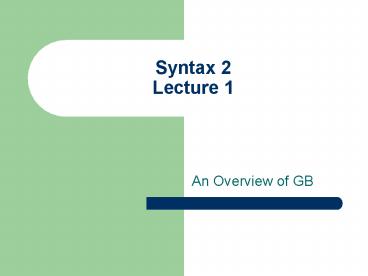Syntax 2 Lecture 1 PowerPoint PPT Presentation
1 / 24
Title: Syntax 2 Lecture 1
1
Syntax 2Lecture 1
- An Overview of GB
2
The Main Questions of Generative Grammar
- What is language?
- What do we know when we know a language?
- How is this knowledge acquired?
3
Language faculty
- an innate language acquisition device specific to
the human species located in the brain.
Genetically given structured, prewired mental
organ determining stages of acquisition, allowing
for cross-linguistic variety.
4
What does the language faculty contain?
- Principles general principles concerning
language, universal - Parameters different options given by the
principles. Different parameter-settings lead to
differences between languages.
5
Language Acquisiton
- Choosing the right parameter.
- How?
6
Generative Grammar
- a set of rules with the help of which you can
generate all and only the well-formed expressions
of (a) language.
7
What Makes a Good Grammar?
- generality the range of sentences the grammar
analyzes correctly. - selectivity the range of non-sentences the
grammar identifies as problematic. - understandability the simplicity of the
grammar itself. - Simple rules can produce complex phenomena if
they interact in complex ways, e.g. chess.
8
Government and Binding Theory
Lexicon
X-Bar Theory
D-structure
Theta Theory
movement
Case Theory
S-structure
9
X-bar Theory
- a module of GB (Government and Binding Theory)
containing three very simple rules to describe
the structure of the expressions of a language - 1. the specifier rule XP ? Specifier X
- 2. the complement rule X ? X Complement
- 3. the adjunct rule (optional, recursive)
- X ? X Adjunct
-
XP ? XP Adjunct -
X ? X Adjunct
10
XPs
- D(eterminer) Phrase
- N(oun) Phrase
- V(erb)Phrase/vP
- P(reposition) Phrase
- A(djective/Adverb) Phrase
- I(nflection) Phrase
- C(omplementiser) Phrase
11
Government and Binding Theory(with the modules
already introduced)
Lexicon
X-Bar Theory
D-structure
Theta Theory
movement
Case Theory
S-structure
12
Theta Theory
- Thematic roles, or theta roles specific semantic
relationship between the verb and its arguments.
The theta-role of the subject is not predictable
(run/look at vs. love/see!) - The verb theta-marks its arguments.
- Theta-theory that component of the grammar that
regulates the assignment of thematic roles.
13
A List of the Major Thematic Roles
- AGENT/ACTOR the one who intentionally initiates
the action expressed by the predicate. - PATIENT the person or thing undergoing the
action. - THEME the person or thing moved by the action
expressed by the predicate. - EXPERIENCER the entity that experiences some
(psychological) state. - BENEFACTIVE/BENEFICIARY the entity that benefits
from the action. - GOAL the entity towards which the activity is
directed. - SOURCE the entity from which something is moved
as a result of the activity. - LOCATION the place in which the action or state
is situated.
14
The Theta Criterion
- Every argument must be assigned a theta-role.
- Every theta-role must be assigned to an argument.
15
Government and Binding Theory
Lexicon
X-Bar Theory
D-structure
Theta Theory
movement
Case Theory
S-structure
16
Case Theory
- Case theory accounts for some of the formal
properties of overt DPs and integrates the
traditional notion of case into the grammar. - Morphological vs. abstract case (in English
abstract case is often not morphologically
realized abstract case is part of universal
grammar) - English case system overt distinction between
NOMINATIVE and ACCUSATIVE can be found in the
pronoun system (with several examples of case
syncretism).
17
Accusative Case
- ACCUSATIVE
- (1) object DP of a transitive verb
- (2) subject DP of infinitival subordinate
clauses - (3) DP complement of a preposition
- ? transitive verbs and prepositions assign
ACCUSATIVE case to the DP they govern, they
case-mark the DP.
18
Nominative Case
- subjects of finite clauses
- NOMINATIVE case is assigned by virtue of the
specifier-head agreement between the subject DP
and finite INFL
19
The Case Filter
- Every overt DP must be assigned abstract Case.
20
Government and Binding Theory
Lexicon
X-Bar Theory
D-structure
Theta Theory
movement
Case Theory
S-structure
21
The Lexicon
- that part of the grammar that lists the
idiosyncratic properties of words, e.g. the
subcategorisation frame (listing the complements
of e.g. a verb)
22
Relationship Between the Lexicon and Syntactic
Structure
- (i) The lexical category of the head of the
phrase determines the category of the phrase. - (ii) The thematic structure of the predicate
determines the minimal components of the
sentence. - Projection Principle
- Lexical information is syntactically represented.
23
Government and Binding Theory
Lexicon
X-Bar Theory
D-structure
Theta Theory
movement
Case Theory
S-structure
24
D-structure, Movement, S-structure
- Sentences have two levels of syntactic
representation - D(eep)-structure this level encodes the lexical
properties of the constituents of the sentence.
It represents the basic argument relations in the
sentence. - S(urface)-structure this level reflects the more
superficial properties of the sentence the
actual ordering of the elements in the surface
string, and their case forms. - The two levels of syntactic representation are
related to each other by means of movement
transformations D-structure ? Movement
transformations ? S-structure

